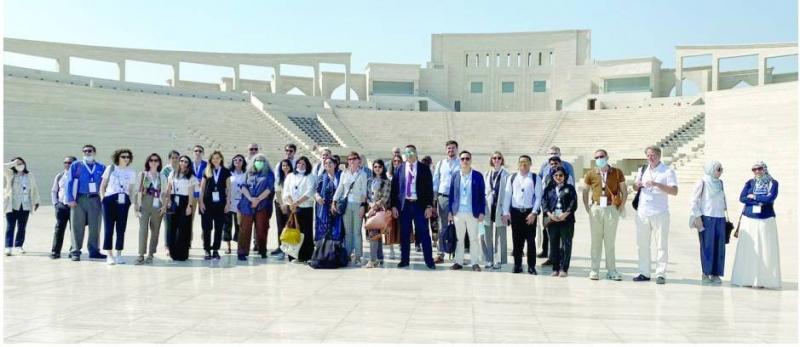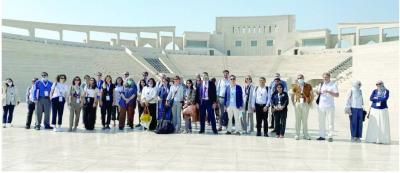The local committee for the 57th International Society of City and Regional Planners (ISOCARP) conference organized several field trips for the international delegations participating in the event to explore various cities, landmarks, and sports and cultural facilities in the country, to understand the aspects of the urban renaissance taking place in Qatar. The tours included Aspire City, where they visited Khalifa International Stadium, Aspire Dome, and the Torch Hotel, a distinctive Qatari architectural icon. They also visited Lusail City, which has become a model for outstanding urban and sustainable planning, and Al Wakrah City to learn about its distinctive features, including Al Janoub Stadium, known for its modern design, ending the tour at Al Wakrah Souq, one of the country’s enduring heritage landmarks.
On another note, activities continued yesterday (Tuesday) for the 57th ISOCARP conference, organized by the Ministry of Municipality from November 8-11 in Doha. A number of workshops were held at several vital urban locations in the country, including Education City - Qatar Foundation, the Cultural Village Foundation (Katara), Aspire sports area, Msheireb Properties, and Qatar Rail.
The second day of the ISOCARP conference included a general session where Ms. Caroline Bos, co-founder of UNStudio, discussed the social responsibility of urban and regional planners to ensure safer, more inclusive, and comfortable living conditions for everyone around the world. The environmental conservation team in ISOCARP also discussed their efforts to preserve one of the country’s environmental gems, the "Mangrove Forest," as part of ISOCARP’s environmental initiatives. Key outcomes from the junior planners’ workshop held in early November were also presented.
On the second day, workshops addressed planning challenges related to the conference's main themes, followed by field visits to various urban landmarks in the country. The first workshop was held at Education City - Qatar Foundation, highlighting its major self-sufficient projects and their urban features (connectivity, accessibility, sustainability...) and its significant role in serving the community. The second workshop took place at Aspire, which included a tour of one of the 2022 World Cup stadiums, Khalifa International Stadium, enjoying the stunning views from the top of the highest building in Qatar, the Torch, and exploring the Aspire Dome, as well as introducing the development efforts in Aspire sports city.
The Cultural Village (Katara) hosted a workshop highlighting Qatar's significant efforts toward building cities that can withstand climate change challenges facing the world. This included an introduction to the Katara project and its development stages, as well as a tour of the cultural village. Another workshop was held in Msheireb Downtown Doha, where participating experts discussed the idea behind the city’s design, with a tour to explore the city and its various sites, discussing urban, smart, and sustainable planning methods. Additionally, a workshop was conducted for Qatar Rail to discuss working papers related to urban planning.




